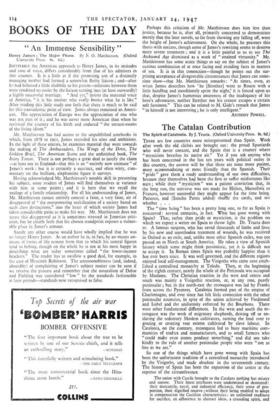BOOKS OF THE DAY
An Immense Sensibility "
INEVITABLY the American approach •to Henry James, in its attitudes and tone of voice, differs considerably from that of his admirers in this country. It is a little as if the promising son of a .distinctly managing mother had formed a somewhat flashy liaison ; and—after he had behaved a little shabbily to his parent—relations between them were rendered no easier by the liaison turning into (at least outwardly) a highly successful marriage. " And yet," insists the maternal voice of America, " it is his mother who really knows what he is like." After reading this little study one feels that there is much to be said for this transatlantic point of view. James always remained an Ameri- can. His appreciation of Europe was the appreciation of one who was not part of it ; and he was never more American than when he revisited the country of his birth and endured " the torture-rooms of the living idiom."
Mr. Matthiessen has had access to the unpublished notebooks in which, from 1878 to 1911, James recorded his aims and ambitions. In the light of these entries, he examines material that went towards the making of The Ambassadors, The Wings of the Dove, The Golden Bowl, The American Scene and the unfinished book, The Ivory Tower. There is not perhaps a great deal to justify the claim —at least not in England—that this is an " entirely new estimate " of James's work : but it is certainly a succinct, and often witty, com- mentary on the brilliant, elephantine figure it surveys.
Having acknowledged Mr. Matthiessen's notable skill in presenting his subject, some readers of James will find themselves at variance with him at some points ; and it is here that we recall the analogy of a family relationship. For all his understanding of James, Mr. Matthiessen cannot entirely conceal a faint, a very faint, air of disapproval of " the overpowering stultification of a society based on such class distinctions," into the heart of which society James had taken considerable pains to make his way. Mr. Matthiessen does not stress this disapproval as it is sometimes stressed in Jamesian criti- cism, but he clearly feels that his chosen standpoint exposes a vulner- able place in James's armour.
Surely any other course would have wholly implied that he was no longer Henry James. As an author he is, in fact, by no means un- aware of forms of life remote from that to which his central figures tend to belong, though on the whole he is not at his most happy in describing what are today sometimes called " the lower-income brackets." The reader has to swallow a good deal, for example, in the case of Hyacinth Robinson. The unreasonableness (and, indeed, absurdity) of complaining of James's subject matter can be seen if we reverse the process and remember that the naturalism of Defoe and Fielding was considered " low " by the standards fashionable at later periods—standards now recognised as false. Perhaps this criticism of Mr. Matthiessen does him less than justice, because he is, after all, primarily concerned to demonstrate merely that the later novels, so far from showing any falling off, were the height of James's achievement. On the whole, he presents this thesis with success, though some of James's rewriting seems to deserve more severe treatment ; and it is a little painful to us to see The Awkward Age dismissed as a work of " strained virtuosity." Mr. Matthiessen has some acute things to say on the subject of James's curious combination of at once facing and avoiding facts in matters of sex. It is in this connection—though he points out the sur- prising acceptance of disagreeable circumstances that James can some- time show—that Mr. Matthiessen remarks: " At times, even, as when James describes how ' he [Strether] went to Rouen with a little handbag and inordinately spent the night,' it is forced upon us that, despite James's humorous awareness of the inadequacy of his hero's adventures, neither Strether nor his creator escapes a certain soft fussiness." This can be related to M: Gide's remark that James " in himself is not interesting ; he is only intelligent."
ANTHONY POWELL.


































 Previous page
Previous page